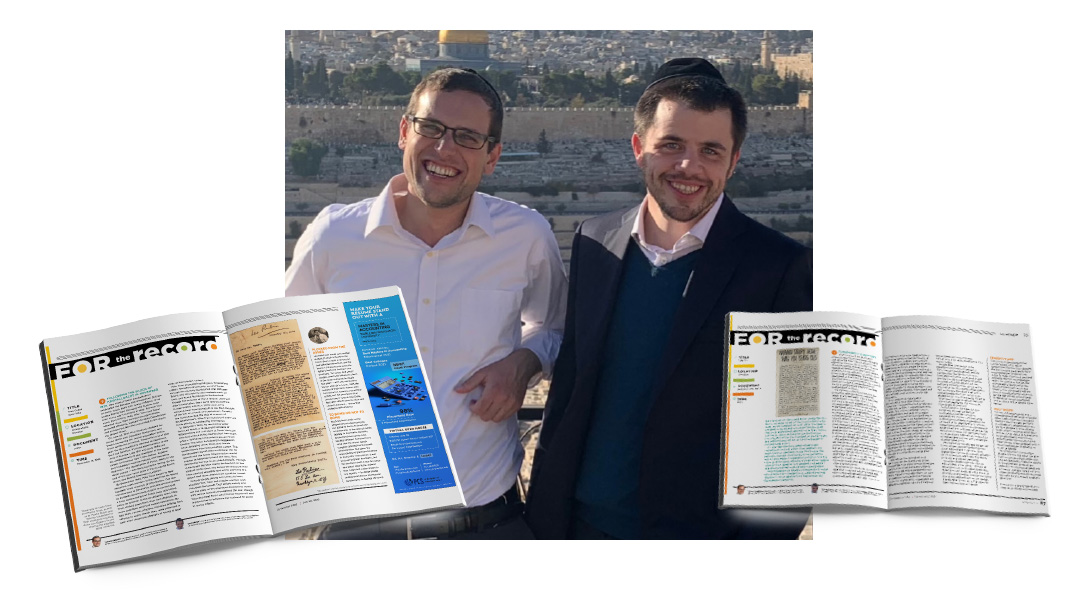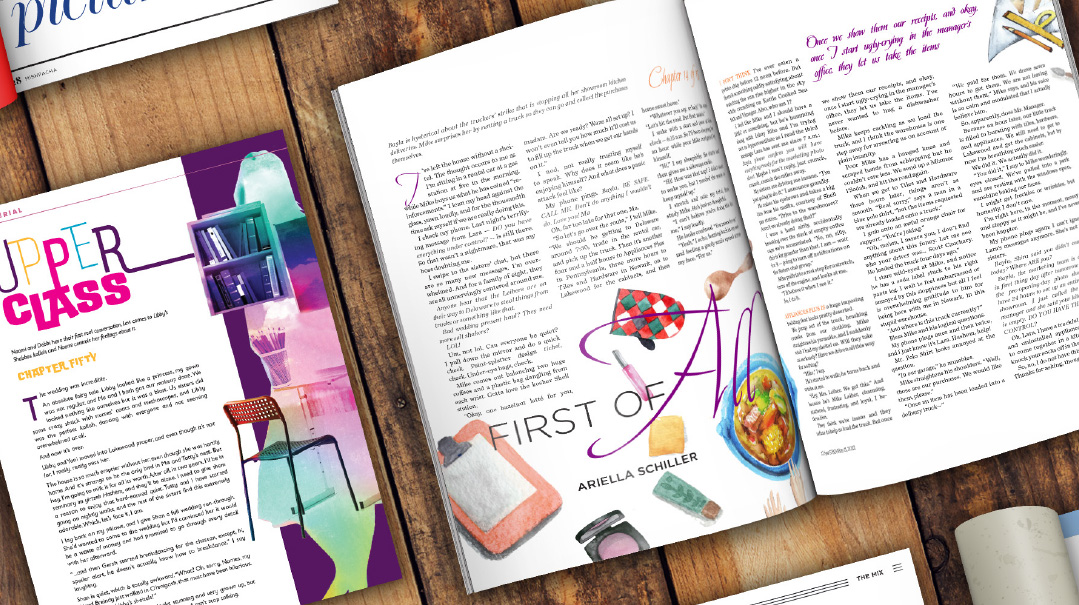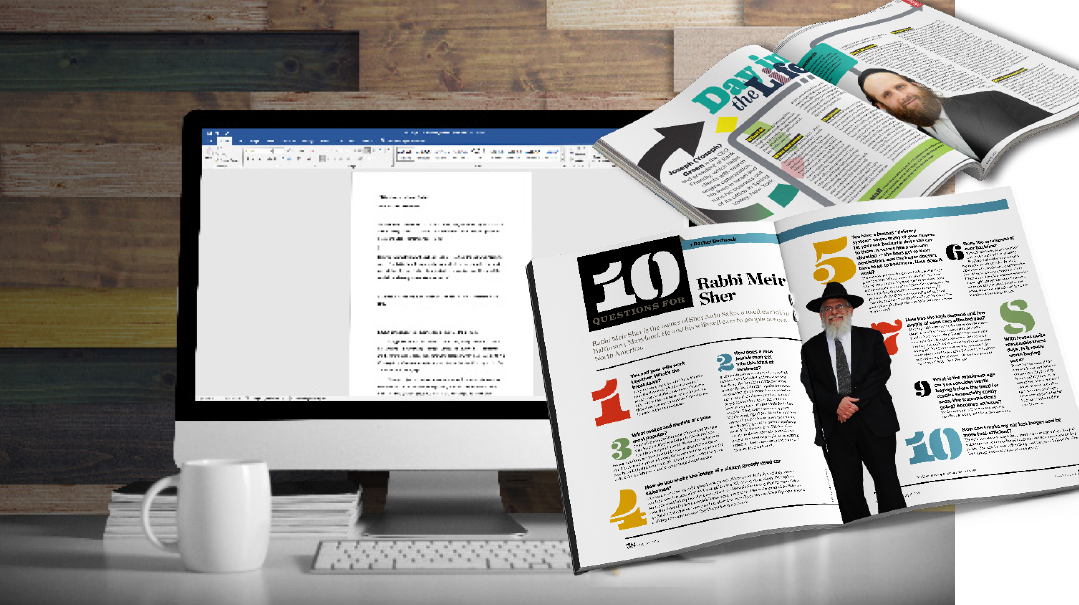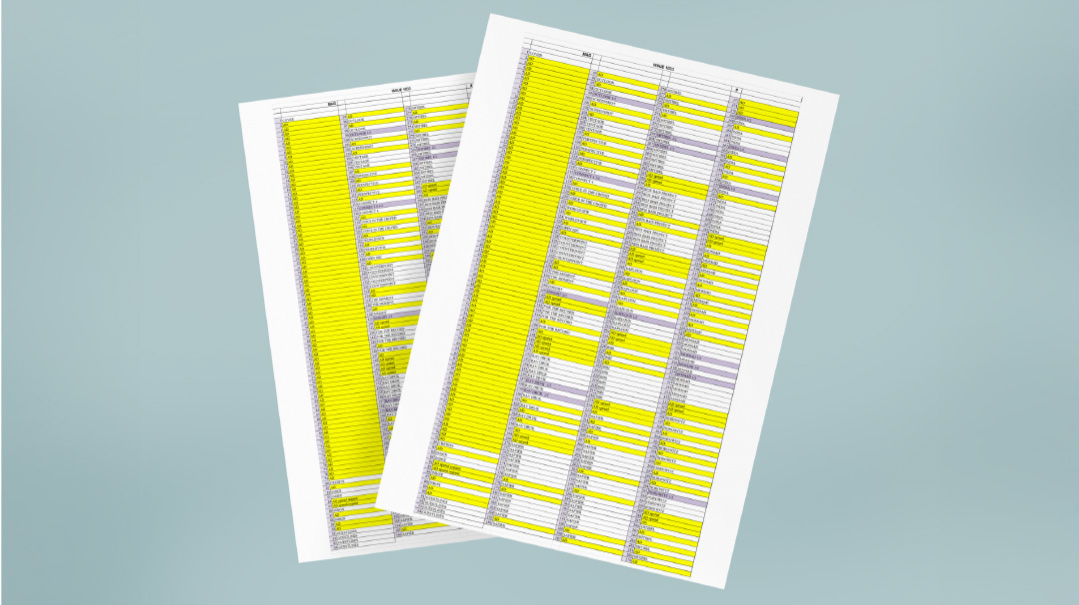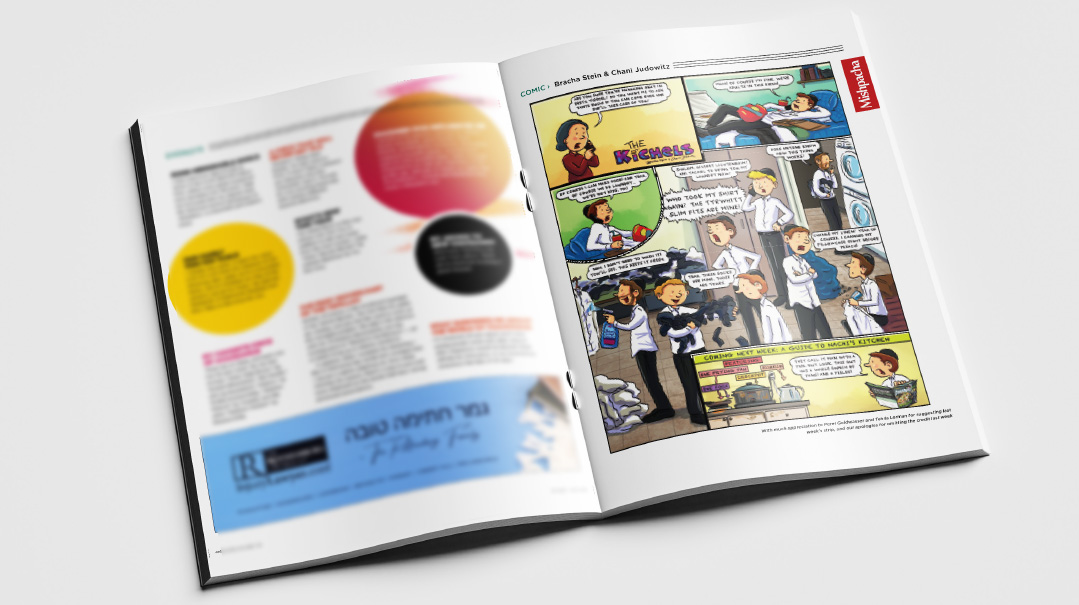20 Questions for Libby Livshin
| January 14, 2025“While a lot of my workload is technical, the rest of it is really meaningful”
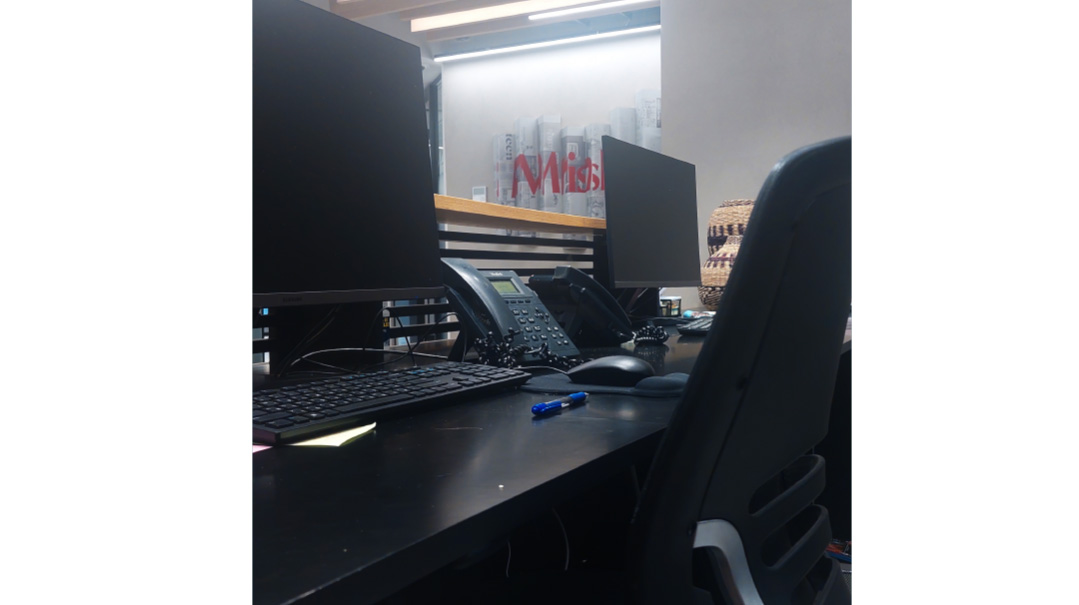
My ideal environment:
I work best with a buzz of people in the background, but absolutely no music, especially not songs with English lyrics, because when you’re writing emails with half an ear on the music, words from the song in the background have a way of sneaking themselves into your email….
The accomplishment I’m proudest of:
When my manager can’t find a single mistake in that month’s payment spreadsheet.
The best advice I ever got:
My predecessor, Lori Friedman Safrin, taught me not to rely on memory, and to make sure to get everything in writing. With so many tiny details to keep track of, this comes in handy on a daily (hourly?) basis.
Raised in Manchester, UK, Libby Livshin, Mishpacha’s administrator, has been living in Israel for six and a half years. She worked as a school secretary in Manchester, and then as a grant writer for Israeli nonprofits in a yishuv just outside Yerushalayim before joining the Mishpacha team. From eagerly reading Mishpacha Jr. comics as a kid before graduating to Binyamin Rose’s Seriously Speaking as a teen, Libby has always been an avid Mishpacha fan. Now she’s back to starting with the comics, because like everybody else, Libby flips to the Kichels first. (In general, she probably shouldn’t be reading the magazine on Shabbos, because she has to stop herself from subconsciously noting payroll entries for each page.)
1
How did you join Mishpacha?
In 2022, I had started a new position with convenient hours and within walking distance from home, but I found the work very tedious. I would buy myself the Mishpacha each week as a bribe to keep going. One day I saw Mishpacha was advertising for a proofreader, and as I’d spent several years at my previous job correcting English material written by Israelis, I decided I was qualified to apply.
Mishpacha was also looking for a replacement for Lori Friedman Safrin, who had been the administrator for 14 years, and was getting remarried and relocating. Content Manager Faigy Hutner, who was handling the recruitment emails at the time, thought I should look at this position instead. The Hebrew-speaking office manager called me to schedule an interview, but I thought it was a spam call and hung up! Thankfully, they got an English speaker to call me back, otherwise who knows where I’d be right now.
2
What does your job involve?
It’s constantly evolving. I manage around 20 mishpacha.com email accounts, some of which are more active than others. I process all letters to the editor and try to help people who reach out to the office for information. I also prepare the monthly freelancers’ payroll for accounting, which means updating a vast and complicated spreadsheet that contains a record of every single page in every single magazine that month — plus translation expenses, photographers, illustrators, and cross-referencing things that were paid in advance but have to be recorded for accounting purposes. I haven’t made any changes to the systems Lori set up, a testament to her organizational excellence.
Then there are also the miscellaneous office management roles such as making sure the office has a good stash of coffee, milk and, most importantly, full-size coffee cups.
3
What do you actually do behind that big front desk?
Well, a job at a magazine may sound very glamorous, but it’s really pretty standard work. When I sit down at my desk, my first step is to work through all 20 inboxes and clean them up. I can’t work with messy inboxes; it gives me a headache. I categorize everything neatly and only then do I start working. (And yes, I have no unread emails in my personal inbox either, and when they say opposites attract — I think the number of unread emails in my husband’s account has long hit the five-digit range….)
Once all the inboxes are cleaned up, I start working on processing payroll for the past week’s magazine. I work through it page by page, recording everything in the spreadsheet and keeping a list of questions to check with the relevant editor when I’m finished. As payday approaches each month, I email every contributor getting paid that month with the details and the amount they can expect to receive.
My job also includes making sure we have a stock of office supplies on hand, organizing the back issues we keep in the archive room, getting the candlelighting times for the magazine credits page, keeping track of a wide range of invoices (everything from our stationery provider to toner deliveries to graphic designers and translators), and making sure everyone in the office has what they need to do their job — be it calculators (today’s request), herbal tea, or the special election supplement we printed back in 2020.
4
Does your job involve more personal interaction or is it more phone and email interaction?
In 2025, most people don’t make calls, so professionally, I work largely with email. But as I work in a busy office, with so many interesting and talented people, there’s always plenty of personal interaction as well — it’s just not strictly job-related.
5
What is the most common query you get from readers reaching out to the office?
There are always people trying to reach out to someone who’s appeared in the magazine. Sometimes when I read the magazine, I can predict that an article will generate lots of queries, and sometimes not. For example, it’s obvious that readers will seek the experts in mental health or ADHD, but not obvious that our Day in the Life column with Dance with Confidence’s Yehuda Spira still gets emails asking for his contact seven years later! If Mr. Spira is reading this, please be in touch with your updated contact information, so we can put all these people in touch with you.
Rivka Streicher’s True Account in 2023, “Chain of Blessing,” about someone who was helped by an unspecified rebbe, probably sparked the most emails we’ve received for one article. It’s special to be able to help people, but also sobering to see how many people in Klal Yisrael are desperately searching for a yeshuah.
6
What has surprised you about your role?
How strong people’s opinions are, and how they feel free to express themselves to the editors — and me, the editors’ gatekeeper — in language they would never use when talking to another person (at least, I hope they wouldn’t!). I also get surprised at people who reach out about potential writing or editorial positions without double-checking their emails for grammar and spelling mistakes.
7
What is the most unusual question that’s been posed to you?
A while back, Mishpacha ran a fabulous article profiling a baal teshuvah who works with at-risk teens. The writer had a very generic, Jewish-sounding pen name (think something like “Chaya Cohen”). We got a lot of positive feedback about the story, but we also got an email from a journalist with the same name as the article’s writer who writes for a very left-wing, non-Jewish publication. She reached out to complain that her friends were asking her why she was writing for us, and she even asked us to print a disclaimer that it wasn’t written by her. We were genuinely curious as to who would be reading both publications and thinking it was the same writer!
8
What are the best parts of your job?
The free magazine each week, for starters. And access to the server with the archives from the last 20 years. I’ve been having a fabulous time rereading old Calligraphy stories and serials (Rappaport 55, anyone?) in my spare time.
I also love hearing feedback from readers. It’s amazing to me how incredibly varied Mishpacha’s readership is — and also how every reader feels the magazine is theirs.
I also enjoy meeting distant family members. I found out that a member of the accounting team, a chassidish lady from Beitar Illit, is my third cousin on my father’s side, and that we also share a great-aunt. What are the chances?
9
What are the challenges?
As with any people-facing role, I have to separate my personal life from my professional role. It’s no one else’s problem if my kids kept me up at night or I got stuck in traffic on the way to work; everyone deserves to be greeted by a calm, cheerful secretary. I also have to be very strict about confidentiality, and while that applies to cute things like not texting my friend when her grandmother sends in a letter, it also means keeping quiet when an acquaintance writes to Mishpacha about a struggle they are experiencing, in response to an article about that topic. There’s so much of my day that I can’t share with my husband or friends.
10
What does closing day — when the week’s magazine is finalized for the printer — look like for you?
Don’t tell this to my coworkers, but closing days are like any other day for me, because I leave at a fixed time regardless. (Eh, who am I kidding, they know it all too well but are gracious enough not to hate me for it!) I actually went through a phase of bringing in baked goods every Monday — usually our closing day — to atone for this. During the pre-Yom Tov season, when their hours get even longer, the graphics team and I trade notes about how many hours after me they left.
11
Does the pre-Yom Tov pressure affect you?
Yes, but in a different way than the others, because my work with the actual magazine begins when everyone else’s ends. I have to have the payroll ready for the tenth of every month for our accounting department to process all those payments, so I get busy once I can record what payment is due to which writer for each page. During Yom Tov season, the team is often given an extra day off before Yom Tov once the magazine is closed, but I’ll be in the office taking care of last-minute things, and then I’m back bright and early on Isru Chag, too, because I have to work through hundreds of pages of content to make sure that everyone who contributed to the mega-issue gets paid for their work. It’s a lot of pressure, especially when Yom Tov coincides with the secular calendar dates of our bookkeeping schedule.
Tishrei is especially busy because we have two huge magazines, Rosh Hashanah and Succos, so I try to stay on top of things by working from the digital files of those issues before they even go to print.
12
Which department do you work with the most?
I have very little professional overlap with most of the team. I’m most regularly in contact with the editors and the accountant. But it’s always fun hanging around in the graphics room and getting a sneak peek at the next magazine. I’m in awe of their creativity — I could never do their job.
13
Have you written or suggested any articles?
I have pitched a few articles, some of which were published and others that weren’t (yet! Eternally optimistic). One that wasn’t was the press release that I forwarded to an editor from one of the Misaskim branches with the incredible story of a Jewish Mossad agent who died a lonely death in a hospital before miraculously being brought to their attention so they could arrange a Jewish burial. But when the editor asked if I had any more details on the story, I did a Google search and found out that with his life story, this Mossad agent was not the type of person we would feature in our magazine!
Personally, I’m really proud of the article where I interviewed my mother-in-law, Dr. Rosalyn Livshin, about her work as an oral historian working with Holocaust survivors. I hope to do a follow-up one day on the many other ventures she’s involved in.
14
What is something you wish was not part of your job?
Ordering food for closing days. I hate disturbing everyone to put together the order, and the pressure of trying to find a place that has a reliable kashrus that everyone eats, offers options that everyone likes, has reasonable delivery prices and can accommodate gluten and dairy free diets as necessary. Oh, and an online order option (ideally in English) so I don’t have to try communicate over the phone in broken Hebrew and worry that I’ve ordered the incorrect option for everyone.
15
The most interesting person you’ve been in touch with at Mishpacha?
Well, I’ve been privileged to have email conversations with esteemed writers such as Rabbi Hanoch Teller, and I’ve also met Benny Ganz (although annoyingly enough, Yaakov Shwekey and the Bardak duo arrived after I’d already left for the day). But sometimes, just seeing the signatures of some of our letter writers is fascinating. Did you know that the Mishpacha readership includes a theater director, a counterterrorism expert, and the head of the international branch of one of the main Israeli political parties (not a religious one)?
16
Any bloopers at your end?
Hmm, what would I want to admit to in a public forum?
Although I’m not really involved in actual content, there are awkward incidents. A reader once wrote in to tell us that an article that had referenced the Satmar Rebbe as Rav Yoel Tzvi had to be wrong, as the Rebbe had a brother named Tzvi Hersh. She then sent a follow up that read “Correction — the brother’s name was Chaim Hersh”. With my limited knowledge of Yiddish, I thought that meant the brother had a different name altogether, and she was withdrawing her original correction. I wrote back to her to thank her for emailing with feedback, and noted that while I hadn’t sent on the letter [as I thought she’d withdrawn it], she was always welcome to be in touch again with any further comments or questions.
On her end, she was understandably quite unimpressed that I wouldn’t pass on negative feedback. I could not understand what was going on, until I asked someone in desperation, and they gently reminded me that Hersh is the Yiddish version of Tzvi….
17
What’s the most satisfying part of the job?
Helping people. While a lot of my workload is technical, the rest of it is really meaningful. Helping people get in touch with interviewees who can help them, connecting old friends who fell out of touch until one was featured in the magazine, sharing feedback from people who were inspired by something in the magazine, are all very motivating. Barbara Bensoussan’s True Account “Speaking from Experience” about Samuel Haft, who struggles with his lost voice, brought in a flood of emails from people who remembered him from school and yeshivah. The African Veld piece in Family First, where a writer shared her memories of her childhood in rural South Africa, really resonated with South Africans. One man called and told me very emotionally that the entire South African community in Israel was talking about the article.
Tracking down an obscure article from an extremely vague description also feels good.
(I am writing to request assistance in locating a specific image that appeared in a recent issue. The image I am referring to shows a rav or rosh yeshivah walking with a talmid and it shows a profound emotional connection. Can you help me track it down?)
18
Tell us about the mi k’amcha Yisrael side of things that you see at your desk.
We recently printed a letter from a wife of a frum man serving in the IDF reserves who felt like she and her friends were not getting enough support from their community. I cannot tell you how many emails we received from people asking if they could be in touch with offers of help. This often happens when we print letters like this. When an older single writes in, we’re bombarded by readers who want to redt them a shidduch. I’m genuinely amazed by how caring Am Yisrael is.
19
When people hear you work for Mishpacha admin, what do they ask you?
If I get a free magazine. Also if I get to meet the writers. Yes, I do, because everyone comes through the Israel office eventually.
20
Where would you be if you weren’t at Mishpacha’s front desk?
I have a degree in nutrition, so maybe I’d be doing that? But most likely I’d be on our couch with a coffee and a good book (or the latest copy of Mishpacha).
(Originally featured in Mishpacha, Issue 1045)
Oops! We could not locate your form.

